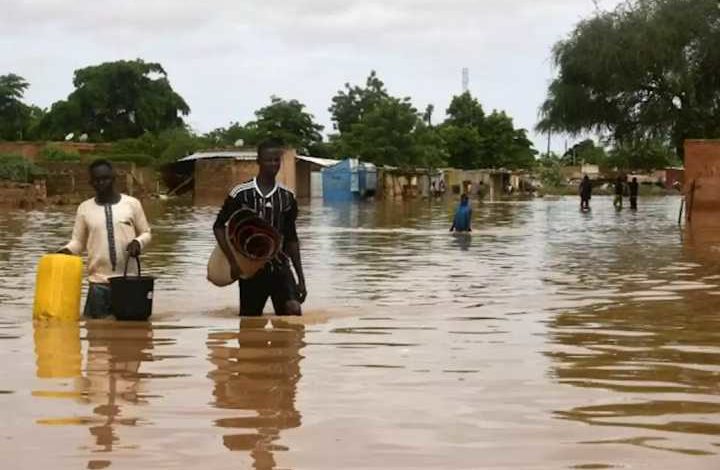Flood Devastates Parts Of Niger Republic As Nigeria Braces For Impact

Floodwater has submerged parts of Niger Republic, including the country’s capital city, Niamey, after prolonged torrential rainfall led to flooding and overflow of River Nigeria.
According to the United Nations Office for the Coordination of Humanitarian Affairs in Niger Republic, over 226,000 people have been affected by floods in three months with most of them in Maradi, Tahoua and Dosso.
An estimated 45 people were reported to have lost their lives, with 20,201 houses destroyed, 4,295 ruminants killed and 5,306 farms destroyed
In Niamey, the Niger Republic capital, several districts around the banks of the river were submerged during the week, according to the country’s authorities.
The dike of the city of Niamey was overwhelmed when the River Niger water level reached a height of 659cm.
According to local reports, the dyke held the flood for many days before the overflow on August 23.
Meanwhile, authorities in Niger Republic have advised citizens located along flood risk areas to evacuate.
In neighbouring Nigeria, the Nigeria Hydrological Services Agency (NIHSA) has asked states to prepare for flood in communities along the River Niger to prevent loss of lives and property.
In a statement during the week, Clement Nze, NIHSA Director-General, identified the following states, Kebbi, Kogi, Rivers, Niger, Kwara, Nasarawa, Kogi, Anambra, Delta, Edo, Rivers and Bayelsa.
“This current development portends some level of concern for Nigeria as there could be a likelihood of flooding in the above-mentioned states. This flood magnitude sighted in Niamey is expected to arrive in Nigeria through Kebbi State around September 6,” Nze said.
He warned that the flood levels at the hydrological stations monitored in Niamey, Niger Republic and Malanville, Benin Republic, have reached the red alert zone, as at August 23.
He said the flood might arrive through Kebbi state around September 6.
“The country still has many days of rainfall in the course of the year. More floods are therefore still expected in the months of August, September and October.
In the event there is a release of excess water from the dams in other countries upstream rivers Niger and Benue this year, this will have more negative impacts on Nigeria which is located downstream other countries in the Niger Basin.”
He added that the management of Kainji and Jebba dams have been informed to take appropriate actions in operating the reservoirs.
“Accordingly, Kainji Dam is now spilling water at the rate of 86.4 million cubic metres/day. This means that communities downstream Kainji and Jebba Dams could be flooded. The Shiroro Dam on Kaduna River is still impounding, though there is the possibility of spilling water in the weeks ahead.”
Support Our Journalism
There are millions of ordinary people affected by conflict in Africa whose stories are missing in the mainstream media. HumAngle is determined to tell those challenging and under-reported stories, hoping that the people impacted by these conflicts will find the safety and security they deserve.
To ensure that we continue to provide public service coverage, we have a small favour to ask you. We want you to be part of our journalistic endeavour by contributing a token to us.
Your donation will further promote a robust, free, and independent media.
Donate HereStay Closer To The Stories That Matter




